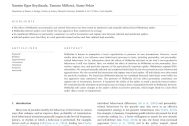Obsah
Wolbachia is known to manipulate a host’s reproduction to promote its own transmission. However, recent studies show that it can influence some behavioural processes in hosts, including personality, and personality-related behaviours. So far, information about the effects of Wolbachia infection on the host’s non-reproductive behaviours is still very limited. Here, we studied the effect of infection by Wolbachia on the personality, locomotion, capture rate, and pesticide exposure of the agriculturally important spider, Philodromus cespitum (Philodromidae). We assayed naturally-infected and uninfected individuals for the two personality traits boldness and aggressiveness. We also recorded the locomotion and capture rate of each spider. All individuals were then tested for pesticide avoidance. We found that Wolbachia-infected (no Cardinium detected) individuals were bolder but less aggressive than uninfected ones. The presence of Wolbachia did not affect personality consistency nor capture rate or locomotion
however, it hampered the ability of the spider to avoid a pesticide-treated surface. We conclude that the alteration of personality may not bring a direct transmission benefit to Wolbachia
however, Wolbachia still causes changes in the spider’s ability to perceive pesticide, which might likely be a side effect rather than a result of manipulation.



